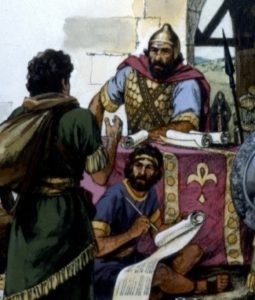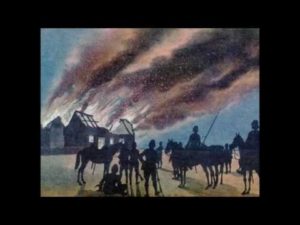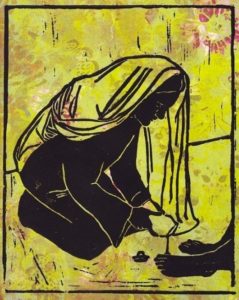Today we finish reading through 1 Samuel.
 1 Samuel 29 is an unusual scene. David has aligned himself with King Achish and the Philistine army as they attack Israel. The other Philistine warriors realize the danger of having David, the famous Israeli warrior, in their ranks. They suspect that he has a plot to turn on them and once again be the Israeli hero.
1 Samuel 29 is an unusual scene. David has aligned himself with King Achish and the Philistine army as they attack Israel. The other Philistine warriors realize the danger of having David, the famous Israeli warrior, in their ranks. They suspect that he has a plot to turn on them and once again be the Israeli hero.
Much to King Achish’s disappointment, David is discharged from the Philistine army. King Achish speaks highly of David, showing great esteem for his character and affection for his friendship. But he yielded to the majority who wanted him ‘out.’
 I believe God was sovereignly intervening and preventing David from an even worse situation. He made the wrath of men to praise Him by fulfilling His purposes (Psalm 76:10).
I believe God was sovereignly intervening and preventing David from an even worse situation. He made the wrath of men to praise Him by fulfilling His purposes (Psalm 76:10).
 When David returns to Ziklag, he discovers that the Amalekites have raided it. Ziklag, his hometown, had been burned, and the enemy had taken the women and all who were in it, including his two wives.
When David returns to Ziklag, he discovers that the Amalekites have raided it. Ziklag, his hometown, had been burned, and the enemy had taken the women and all who were in it, including his two wives.
David’s men were very discouraged, bitter in spirit, and wanted to stone David to death.
Notice what David did:
1 Samuel 30:6 6 Moreover David was greatly distressed because the people spoke of stoning him, for all the people were embittered, each one because of his sons and his daughters. But David strengthened himself in the LORD his God.
Do you know how to strengthen yourself in the Lord?
 How about this advice from Jude?
How about this advice from Jude?
Jude 1:20-21 20 But you, beloved, building yourselves up on your most holy faith, praying in the Holy Spirit, 21 keep yourselves in the love of God, waiting anxiously for the mercy of our Lord Jesus Christ to eternal life.
Ephesians 5:17-19 17 So then do not be foolish but understand what the will of the Lord is. 18 And do not get drunk with wine, for that is dissipation, but be filled with the Spirit, 19 speaking to one another in psalms and hymns and spiritual songs, singing and making melody with your heart to the Lord.
David seeks the mind of the Lord through the mediation of the priest and his ephod. David does not presume victory. The word of the Lord tells David what to do. In this case, David is told to pursue the enemy and is assured of victory (1 Samuel 30:8).
David and 400 of his 600 army pursued the Amalekites (200 men were too exhausted to cross the ravine).
David meets an Egyptian slave of an Amalekite who directs David to the enemy’s whereabouts. David fights from dawn to dusk and RECOVERS ALL THAT WAS LOST.
This is a great picture of the rescue provided by our GREATER DAVID, Jesus Christ, who said,
John 18:9 9 “Of those whom You have given Me I lost not one.”
When David returns from battle with the plunder, those who fought with him through the heat of the day were upset that he offered a portion of the plunder to those who stayed behind with the supplies. David honored all his team, even those who were not on the front lines.
1 Samuel 30:23-25 23 Then David said, “You must not do so, my brothers, with what the LORD has given us, who has kept us and delivered into our hand the band that came against us. 24 “And who will listen to you in this matter? For as his share is who goes down to the battle, so shall his share be who stays by the baggage; they shall share alike.” 25 So it has been from that day forward, that he made it a statute and an ordinance for Israel to this day.
David also sent some of the plunder to the elders of Judah. Perhaps he was preparing them, his own tribe, and the largest, to receive him eventually as King?
In the final chapter of 1 Samuel, the war between Israel and the Philistines continues. Saul and Jonathan die.
First, Jonathan and his brothers, Abinadab and Machishua, are struck down by archers on Mount Gilboa. Then Saul was badly wounded, having been shot with arrows. He asks his armor-bearer to kill him. When he refuses, Saul decides to fall on his own sword. When his armor-bearer sees it, he too kills himself in the same manner.
Once again, Saul takes matters into his own hands, without thinking of God, or seeking His guidance.
As a result of this loss, the Philistines gloat in their victory, and they decapitate and desecrate the body of King Saul. The men of Jabesh-Gilead take the bodies of the slain royals which were hanging as a public display, and burn them. They bury the bones and fast for seven days in mourning.
TODAY’S READING FROM THE NEW TESTAMENT -JOHN 11:54-12:19
Today’s reading follows from the last words we read yesterday.
John 11:53 53 So from that day on they planned together to kill Him.
Verse 54 begins with the word, THEREFORE. Jesus is not going to play into the hands of His enemies. He has come to do the will of the Father. He will not let His enemies take His life. He was going to give it.
The chief priests and Pharisees had already put out an order for his arrest (11:57). They give orders to have Him brought to them if anyone sees Him, for He is expected to be in Jerusalem for the approaching Passover.
Jesus withdraws from the public to the village of Ephraim near the desert. Then, 6 days before the Feast, He arrives at Bethany, the home of Lazarus, Mary, and Martha. They give a dinner in Jesus’ honor.
Once again, Martha is serving. But we can assume that she was not distracted by her work from the chief purpose of honoring Jesus, as she had been on a previous occasion (Luke 10:40). Perhaps her sense of priority had changed since she had personally experienced the power of resurrection in her household. Jesus had raised her brother from the dead. She now attended to Jesus not only as a friend but the Resurrection and the Life!
What is especially touching is Mary’s response to Jesus.
Mary anointed Jesus with the pure oil of nard (spikenard). It was a fragrant ointment, costing 300 denarii (an average annual salary) imported from the mountains of India. It was used to anoint kings. Perhaps Mary was discerning His royal Messianic office as King of Kings. Jesus pointed out prophetically that this would be her only opportunity to anoint His body before burial. In the end, Nicodemus would be the one who would anoint the dead body with a 100-pound mixture of myrrh and aloes (John 19:39-42). The women who prepared spices and ointments to anoint the body did not get to do so because of the stone sealing the tomb and the beginning of the Sabbath (Luke 23:56, 24:1). The gospel writers record that Mary Magdalene and Mary, the mother of Joses, were observing the burial procedures under the supervision of Joseph of Arimathea and identifying the tomb so that they might return after the double Sabbath to anoint the body themselves (Matthew 27:61; Mark 15:47; Luke 23:55; 24:1). Of course, they could not do so, for when they would return on the first day of the week, the tomb would be empty, and Jesus risen from the dead!
 Judas reacts to Mary’s extravagant display of devotion. “Why this waste?” (Matthew 26:8) Judas is conscious of the cost. If Mary wanted to give sacrificially, she could have sold the spikenard and put the money in their ministry fund, ‘so it could be given to the poor’ (John 12:5). The Apostle John points out that Judas said this not because he was interested in the poor, but because he was the keeper of the money bag and had a habit of helping himself to it. He was a thief (John 12:6).
Judas reacts to Mary’s extravagant display of devotion. “Why this waste?” (Matthew 26:8) Judas is conscious of the cost. If Mary wanted to give sacrificially, she could have sold the spikenard and put the money in their ministry fund, ‘so it could be given to the poor’ (John 12:5). The Apostle John points out that Judas said this not because he was interested in the poor, but because he was the keeper of the money bag and had a habit of helping himself to it. He was a thief (John 12:6).
The other gospel writers let us know that Judas was not alone in his disapproval of Mary’s act of sacrificial devotion. Mark says, “Some were remarking indignantly to each other, “Why has this perfume been wasted” (Mark 14:4). Matthew informs us that these were the thoughts of ‘the disciples’ (Matthew 26:8).
Jesus rebukes His disciples and commends Mary. “She has done what she could” (Mark 14:8). Jesus discerned that she had intended to save the perfume for the day of His burial. Jesus speaks prophetically. “She has anointed my body beforehand for the burial.” “The poor you will have with you always, but you will not always have me.” And Jesus came to give His life for the poor.
The chief priests discover that Jesus is with Lazarus at Bethany and make plans to kill both (John 12:10). Why? Because many people were going over to Jesus (and away from their hollow religion) because Jesus had raised Lazarus from the dead (John 12:11).
John records the triumphant entry of Jesus and the public declaration that Jesus was the Son of David (Messiah) who was fulfilling Zechariah 9:9.
John humbly confesses that he and the disciples did not realize that prophecy was being fulfilled at the time (John 12:16) until after the Holy Spirit had been given at Pentecost to illuminate his understanding.
John 12:16 16 These things His disciples did not understand at the first; but when Jesus was glorified, then they remembered that these things were written of Him, and that they had done these things to Him.
Later in the Upper Room, Jesus would explain the role of the Holy Spirit as the Divine Remembrancer:
John 14:26 26 “But the Helper, the Holy Spirit, whom the Father will send in My name, He will teach you all things, and bring to your remembrance all that I said to you.
The large crowd attending Jesus’ prophetic entrance to Jerusalem was due to Jesus gaining popularity for His miracles more than His truth claims (12:18). Nevertheless, it made the Pharisees realize their efforts to dissuade people from following Jesus were getting nowhere. Their jealousy can be discerned in their words.
John 12:19 19 So the Pharisees said to one another, “You see that you are not doing any good; look, the world has gone after Him.”
TODAY’S READING FROM THE BOOK OF PSALMS- PSALM 118:1-18
The Lord has indeed devised a way for us who were under the sentence of death not to be given over to death. “For the wages of sin is death, but the free gift of God is eternal life in Christ Jesus our Lord.” (Romans 6:23).
This is the final psalm of the Hallel psalms. It is sandwiched in between the shortest Psalm (Psalm 117) and the longest Psalm (Psalm 119). Psalm 118 is also sung at the Passover and as people entered the temple. It expresses the joy of God’s people when they behold what He has done on their behalf. It is likely that it was written after the Babylonian captivity, for the dedication of the restored walls and gates of the rebuilt city of Jerusalem in the time of Ezra and Nehemiah at the Feast of Tabernacles in 444 B.C.
Although they had been surrounded by enemies who resisted the work, the walls of Jerusalem were rebuilt in just 52 days. It was the Lord’s work, and it was marvelous in their eyes. This Psalm anticipates praise for the finished work of redemption accomplished by our Lord Jesus.
Psalm 118 was Martin Luther’s favorite Psalm. He writes, “It has helped me out of many great troubles, when neither emperor, nor kings, nor wise men, nor saints, could help.”
It is likely that this Psalm was sung by Jesus in the Upper Room at the close of His celebrating the Passover with His disciples (Matthew 26:30).
It also prefigures Christ’s road to the cross. He focused on the joy set before Him- fellowship with the unfailing enduring love of God.
“His love endures forever.”
Here is an excellent verse to memorize:
Psalm 118:6 6 The LORD is for me; I will not fear; What can man do to me?The ‘I’ here, is not referring just to the Psalmist, but to the people of God.
Psalm 118:7 7 The LORD is for me among those who help me; Therefore, I will look with satisfaction on those who hate me. (Some versions read: “I will look in triumph on my enemies.”)The Psalmist looks back on his history and sees how God has helped him cut off the enemy’s advances.
We can sing with the Psalmist:
Psalm 118:14 14 The LORD is my strength and song, And He has become my salvation.
Let us remember that the Lord has delivered us from the wages of sin that we might receive His gift of life, and therefore we can sing:
Psalm 118:17-18 17 I will not die, but live, and tell of the works of the LORD. 18 The LORD has disciplined me severely, But He has not given me over to death.
TODAY’S READING FROM THE BOOK OF PROVERBS- PROVERBS 15:24-26
Proverbs 15:24-26 24 The path of life leads upward for the wise That he may keep away from Sheol below. 25 The LORD will tear down the house of the proud, But He will establish the boundary of the widow. 26 Evil plans are an abomination to the LORD, but pleasant words are pure.
It is wise to take the high road, the right road, although its ascent is steep and difficult. The road that appears to be paved with success could be leading to hell. The Lord will tear down the house of the proud but establish a secure inheritance for the humble who put their trust in Him. Feed on God’s pure word and not the evil inclinations of your heart.
PRAY FOR THE NATIONS
Faeroe Islands
Geography
Archipelago of 18 rugged islands between Iceland and Scotland, 16 of which are inhabited.
Population: 50,152 Annual Growth: 0.63%
Capital: Torshavn
Urbanites: 40.3%
Peoples
Official language: Faeroese, which is of the Scandinavian family; Danish
Religion
Largest Religion: Christian
|
Religion |
|
Pop % |
Ann Gr |
|
45,433 |
90.59 |
0.5 |
|
|
14,430 |
28.8 |
2.0 |
Challenges for Prayer
The Faeroese need revival. From the Lutheran Church (with many nominals as well as a solid evangelical contingent) to the Pentecostals and charismatics, local Christian leaders all agree that these islands are starting to see a fresh move of the Holy Spirit. The Lutheran Church has declined, but its recent independence from Danish Lutheranism sees an emerging evangelicalism, such as the growing Pietist Home Mission with 35 prayer houses and up to 5,000 affiliates. Pray for the Spirit to make the Faeroes truly Christian – and not just in name only.
PRAYER: Lord, we admit that we need You every moment, every hour. You are our deliverer. Apart from Your Sovereign mercy, we would be still in the enemy’s camp, like David with the Philistines. But You intervened. When the enemy pillaged our lives, You recovered all on our behalf. We thank You that of all whom the Father has given, You have lost none! We give thanks for Your goodness! Indeed, Your love endures forever! We want our lives to display the fact that You are our greatest treasure and worthy of our extravagant devotion. Help us to pour out our all for You. In Jesus’ Name. Amen.


